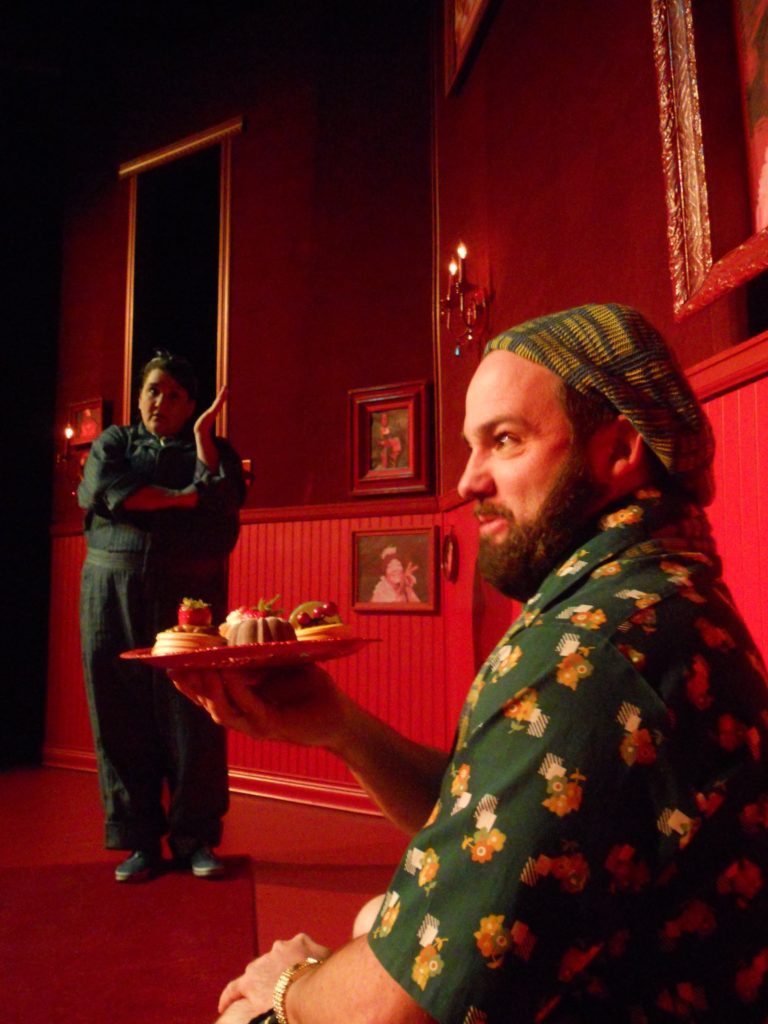Having introduced us to their own school of opera last spring, with Tommy Lee Jones goes to the opera alone, the inimitable ensemble follows up with an intriguing confection, Sweet Tooth, a Buntportesque operetta (music and lyrics by Adam Stone, additional lyrics by Chessy Normile, book by the ensemble), the company’s 32nd world premiere.
Opera buffo was never like this! The queen of theatrical voguing, Erin Rollman stars as George, a reclusive and eccentric patron of the arts. Much like the Archduke Ferdinand purportedly said of Mozart’s eternal celestial compositions — “… too many notes!” — George has it in for Charles Dickens’ plethora of words (written in serial form, to maximize commercial sales), because his touchstone novels keep her from being the chronicler of her own life, in the moment, every moment.
George has a point, that life can be art, much like Zen, we suggest, which practices mindfulness in many forms — just sitting (Zazen), flower arranging, gardening, baking, archery, tea, etc. — with the goal of expanding these meditative states to all waking and dreaming consciousness.
Only, in this case, George’s art has taken a fatalistic turn, like Jehovah’s Witnesses who watch their children die rather than allow emergency medical care. But George has her reasons, and a penchant for being the observer, not the subject, begging the question: If the highest erudition of life is metaphor, what place do our instincts (including those related to survival) have in such a cerebral universe?
Unlike the Jehovah’s Witnesses, George is imposing restrictions only on herself — and, to a degree, on her personal assistant, Hortense (Hannah Duggan) and her kept man, Mister (Brian Colonna), a painter, who humor their compelling, independently wealthy sponsor.
Duggan shines as the gatekeeper to George’s red-saturated world. Perhaps this is all a dream engendered by some indigestive experience of Mark Rothko — while listening to opera as he painted — though the clashing green patterns worn by Mister argue for an alternate interpretation involving Matisse. Who knows what free-associations pass through Buntport’s gray matter?
If there is a surrogate for middle-of-the-road bourgeois sensibilities in this alternate universe, it is Dr. Manette (a circumspect and then delightfully transformed Erik Edborg), a dentist contracted (by George!) to provide a visceral, yet third-person, experience of what to expect when dealing with a problematic sweet tooth.Colonna’s eclectic affectations as Mister are a send up from a newly discovered dimension lying somewhere between naughty British humor and the flamboyant excesses of the French court before its abused subjects made the guillotine famous.
While Hortense takes the hit for George, and George begins her passage to another world, we are left examining the nature of this self-described “dark musical comedy,” in this case a genre-bending brew of sophisticated intellectual jokes and commentary wrapped in a post-modern series of settings and arias that recall the psychological introspections of Brecht/Weil and Sondheim more than the tragic and comedic portraits of Verdi or Rossini.
Within such a world, one wonders, sometimes, where the cathartic experience takes place. This was one of those “sometimes.” As Aristotle noted, catharsis is de rigueur in tragedy, though we can only extrapolate what the great philosopher might have said about comedy (the manuscripts having been lost). We assume he would concur that “laughter is the best medicine.”
Where that leaves us with Sweet Tooth is digging deeper for a cathartic thread. If we wrap all of the musical’s multifaceted genre elements within a larger envelope of “theatre of ideas,” we find an intellectual catharsis somewhere in the sparsely populated aethers, among overlapping subsets of various Platonic forms. Shaw was the master of this, of course, but he was able translate philosophical idealism into characters with whom theatregoers could identify, and thus share in the transformative moments (his introductory essays to his plays provided an excellent means of defining topics from which he created character relationships in which topical discussions found natural expression).
Applying this Shavian approach to George, we land in Limbo — not an unfamiliar place for the human race. If you’ve seen The Three Penny Opera (an excellent rendition at Miners Alley Playhouse closed on October 21st), you may recall that Brecht inserted a “substitute ending” to send the audience home on a high note after deftly mocking and eviscerating the state of civilization. Isn’t this ambiguity in The Three Penny Opera‘s finale much like the coma in Sweet Tooth‘s coda? Perhaps, though Sweet Tooth‘s tenuously extended intellectual themes would likely reveal more harmonics by reading the script — of which, ironically, Dickens would approve — rather than hearing it pass quickly in dialogue a number of decibels below the soundtrack.
-Bob Bows, October 25, 2012, coloradodrama.com
